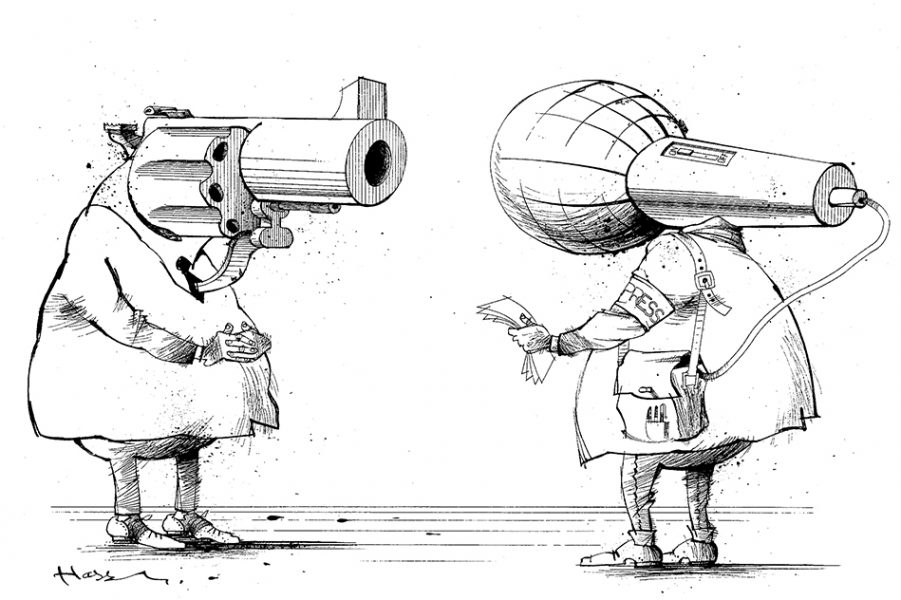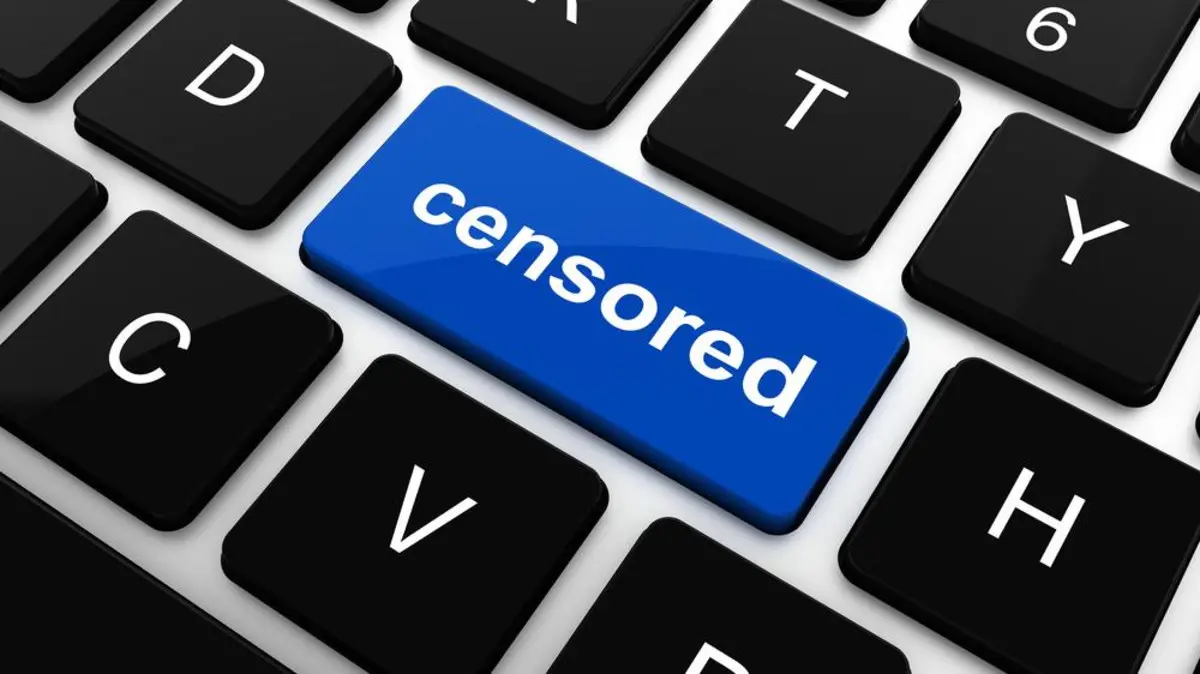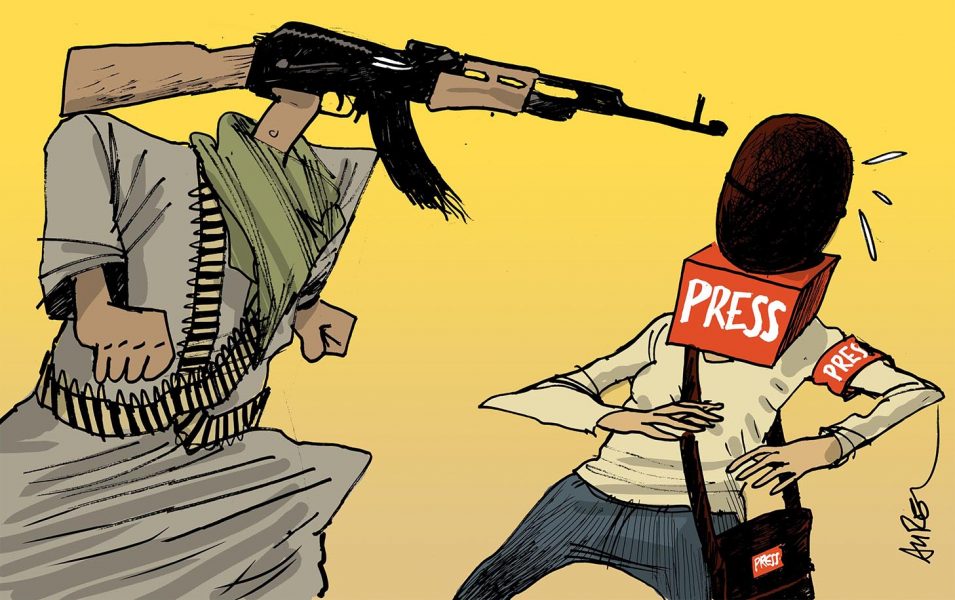By Anna Tsekani,
Despite the fact that technological development has been enormous over the years, and that theoretically human life conditions have improved, it is frequently observed that many times people’s rights are irreparably violated, which one could say that technology helps in the completion. Censorship is an increasingly widespread concept that usually violates basic human rights. The regime severely restricts the freedoms of speech and assembly and forbids legitimate political opposition. In areas under government control, corruption, forced disappearances, military tribunals, and deaths in captivity are all too common. Local and international restrictions have denied Syrians unrestricted access to global news, websites, and references, which most of us take for granted.
Cambridge dictionary offers two main definitions for the term censorship: According to the Cambridge Dictionary, the term “Censorship” is defined as the action of preventing part or the whole of a book, film, work of art, document, or other kinds of communication from being seen or made available to the public, because it is considered to be offensive or harmful, or because it contains information that someone wishes to keep secret, often for political reasons.
At the same time, censorship can also be defined as the system in which an authority limits the ideas that people are allowed to express and prevents books, films, works of art, documents, or other kinds of communication from being seen or made available to the public because they include or support certain ideas.
Taking into account that one of the ten amendments to the Bill of Rights, specifically the First Amendment, gives everyone living in the United States of America the right to hear all sides of every issue and make their own decisions about those issues and incidents without government interference or limitations. At the same time, the First Amendment guarantees people the right to speak, publish, read, and view whatever they want, associate with whomever they want, and band together to petition the government to change the law or correct societal wrongs.
The First Amendment’s right to speak and publish has been widely interpreted to protect individuals and society from government attempts to suppress ideas and information and to prohibit government censorship of books, magazines, and newspapers, as well as art, film, music, and Internet materials. Although the right to speak and publish is theoretically an inalienable right, nowadays censorship thrives in the information age. In theory, new technologies make government control of the flow of information more difficult, if not impossible. Some argue that the birth of the Internet heralded the end of censorship.

Traditional censorship was essentially a cut-and-paste operation. Government agents frequently inspected the content of newspapers, magazines, books, movies, or news broadcasts before they were released, suppressing or altering it so that only information deemed acceptable reached the public. Censorship in dictatorships meant shutting down uncooperative media outlets or exiling, imprisoning, or murdering unruly editors and journalists.
Censorship began in the early 1990s when journalism went online. Filtering, blocking, and hacking have taken the place of scissors and black ink. Some governments blocked access to Web pages they did not like, redirected users to sites that appeared independent but were actually controlled by them, and influenced chat rooms and discussion groups through the participation of trained functionaries. They directed anonymous hackers to vandalize the sites and blogs of critics, as well as disrupt their online presence by defacing or freezing their Facebook pages or Twitter accounts. And that exactly is the power of censorship in a generation where the right to speak and express ourselves exists only in theory.
How a government censor often reflects the tension between projecting an image of democracy and ruthlessly suppressing dissent in illiberal democracies. Some governments are attempting to reconcile this contradiction by secretly controlling censorship groups. Alternatively, they use currency controls to deprive publishers of newsprint. Or they encourage irritated journalists to migrate from major newspapers to online startups where they must build new audiences. This allows the government to maintain control of the news media while remaining undetected.

A very characteristic example of censorship is the case study of Syria. One of the most oppressive governments in the world and other belligerent forces in Syria’s civil conflict seriously impair political rights and civil liberties. Because of the government’s suppression of dissent and the repercussions of the continuing civil conflict, Internet freedom in Syria is severely constrained.
Online activists and journalists work in a gravely unsafe environment, and security authorities frequently detain, torture, and arrest people for their online activity. The government has put in place an “Internet rationing” program that caps the amount of data that residents can use each month in the midst of the war-related economic crisis. There is widespread censorship, which mostly targets anti-government and opposition news sources.
In reality, journalists and researchers in Syria are currently unable to access a large number of blocked websites because they are allegedly “anti-state policy”.
The Ministry of Communications and Technology began implementing an “Internet rationing” system in March 2020, resulting in price increases. The speed of a broadband connection is reduced if a subscriber exceeds the threshold for using it.

In November 2019, the Turkish government launched a military offensive in northeastern Syria, causing Turkish Internet service providers to cut off connectivity for customers in the affected region at the same time users took part in a number of online campaigns to protest the civil war, the economic situation, and forced military service, though many Syrians continue to practice self-censorship in order to avoid retaliation from the authorities.
Though, the most interesting aspect is that not only do Syrians face internal censorship, but foreign countries are also complicit in this lack of information. Many services and websites in Syria have been blocked as a result of external sanctions. The country has been sanctioned, including the blocking of educational websites such as the American Learning Center and the British Council.
Users in Syria have employed a variety of strategies, including the use of proxy apps, in which the blocked website provides links to its content via a proxy service that makes it appear as if the user’s device is connected from a different geographic location. However, these apps can be extremely dangerous.
Due to the high cost of paid proxy services and the difficulty of making online payments, many Syrian users rely on free proxy apps. Most free proxy apps are dangerous because they do not provide adequate protection. He explains that proxy detection “allows government tracking software to easily access the IP addresses of proxy users by limiting the number of people using this application to a specific geographical range”.
The right to access the Internet is a universal human right recognized by the United Nations Human Rights Council. Internet censorship restricts people’s access to websites, including global educational and cultural sites, and thus violates their freedom of expression. Indisputably, Syrians struggle to obtain one of their most fundamental rights: the freedom to access information and knowledge, particularly when it is widely and easily available to the rest of the world.
References
-
First Amendment and Censorship, ala.org, Available here
- Censorship In Syria: A double Virtual Penalty, smex.org, Available here




